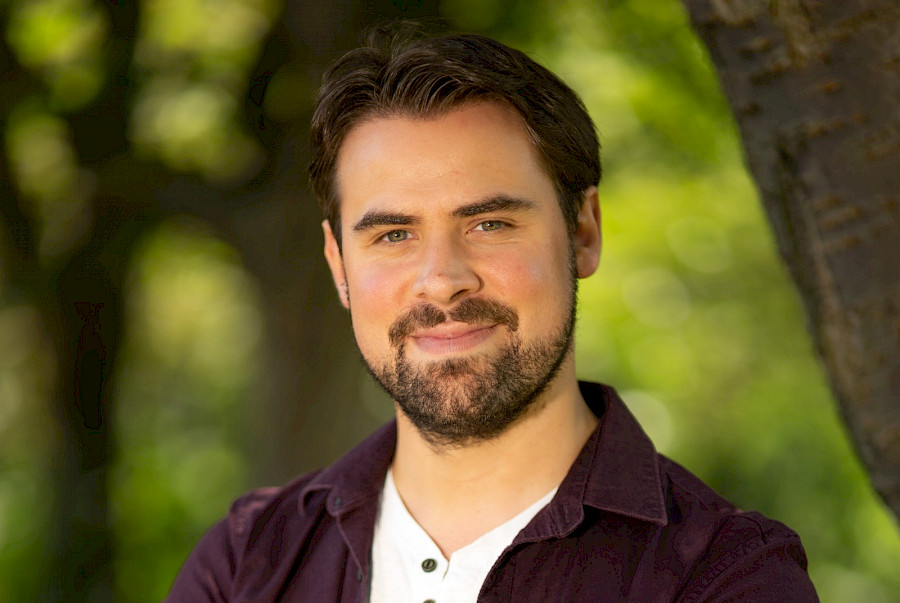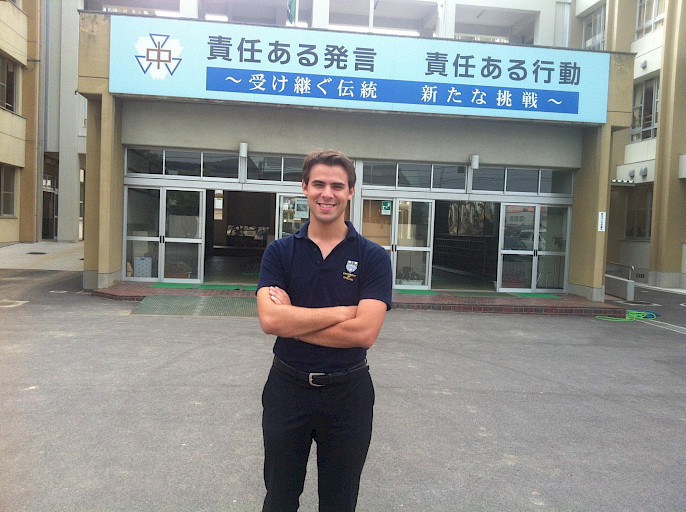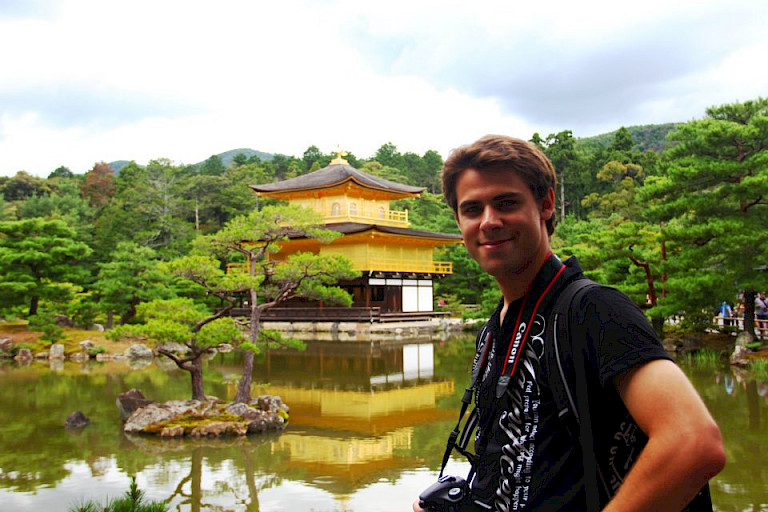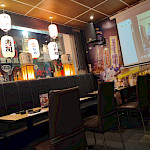27 Apr 2024
JETAA News

13th November 2022
JET Spotlight: Gavin Hugh
We recently sat down with JET Alumni Gavin Hugh. Gavin runs his own digital media business called MidgieBite Media, which offers video production, photography, and aerial drone services. They do projects for businesses and charities, as well as events coverage and music videos.
"I've been running my business for around five years now. We're currently developing our first documentary film - it's a huge undertaking, but we have a great team and it's proving to be a lot of fun!"
Why did you decide to go on the JET programme and where did you go?
Like a lot of media graduates, I was feeling a bit frustrated in my first year after leaving university, as it felt like the opportunities to work in film and television were very restricted and hard to come by.
At the time, I was aware of the JET programme, and as I had always been fascinated by Japan and Japanese culture, I decided that it would be a good time in my life to put my media ambitions on hold and pursue that passion instead. As it turned out, it was one of the best decisions I ever made.
During my time on JET, I worked as an ALT in Takamatsu City, which is in Kagawa prefecture, which is right on the coast of the Seto Inland Sea. It's a beautiful place with a stunning coastline and regular ferries out to the nearby island communities. The small city was just the right size for me, and it wasn't long before it felt like home.
Kagawa is also famous for udon noodles - I must have eaten around three bowls a week on average!

What are some of your best JET memories?
Life on JET gave me three of the best and most memorable years of my life, so it's really hard to pinpoint specific memories. It was just a fantastic experience, and one I'm incredibly grateful to have had.
Working in both elementary and junior high schools was an incredibly rewarding experience. Teaching wasn't something I'd considered doing before JET, but working with students and seeing them progress in ability and confidence was brilliant. The elementary school students in particular were always uplifting to work with - their energy and sheer enthusiasm couldn't help but raise your spirits, no matter what kind of day you were having.
Building friendships in the local community was a really unique experience. I know a lot of ALTs who spent most of their social time with other gaikokujin, but I made a real effort to build local connections and friendships with colleagues and the local community. Those friends invited me to meet their families, to birthday parties and festivals, and one even taught me how to play the shakuhachi (bamboo flute). The memories I made with those friends are really special to me.
As a result of those experiences, I've made really strong friendships in Japan, and have "pen pals" who I still keep in touch after all these years. I couldn't have asked for anything more from my experience.
What was your biggest challenge whilst on JET, and how did you overcome it?
I didn't speak much Japanese at all when I arrived in Japan, so the language barrier was quite daunting in my everyday life. In some ways, this was actually a really good motivator to improve my Japanese - it was very rewarding (and practical!) to read more and more kanji around me, and I was able to engage in better conversations with local people in my community.
My biggest challenge was actually getting used to the fact that the local ATMs had closing times and wouldn't let you withdraw money in the evenings - I wasn't really used to carrying much money on me in Scotland, and was frustrated that I couldn't withdraw money at short notice. I don't think I ever got completely used to that, though I did manage to schedule times to visit ATMs into my days and it became less of an issue over time.

How did your career progress after finishing JET?
I've had a pretty varied career since returning to Scotland from Japan: I've also worked in television as a video journalist for STV, a camera operator for Sky News, and worked in politics at the Scottish Parliament as a senior caseworker and press officer for a number of MSPs.
JET definitely helped me get my job at STV, as my time in Japan helped me stand out from the other applicants. My producer had an interest in origami and I was able to talk about it at the interview. It might sound simple, but that helped me build a rapport that helped me move into working in television - and, ultimately, my current work in digital media.
What skills did you bring from JET to your current career?
Working in Japan and being immersed in that culture teaches you a lot about patience, discipline, and respect. All of those skills are directly transferable into any career, and I know from my own experience that JET made me a more dedicated and focused worker.
The language gap was also very helpful in its own way, as I learned a lot more about non-verbal communication and problem solving when words weren't enough to convey meaning.
The ability to adapt and thrive in a new culture - particularly one as different as Japan is from Scotland - is extremely helpful, as every workplace has its own unique culture. Adapting to life in Japan taught me resilience and helped me adapt to other new environments. This has been really helpful as I've moved into different roles across different sectors, and when working with different clients for my business, all of whom have very different work cultures and expectations.

How do you think JETs can get involved with Japanese cultural relations even after returning to Scotland?
To be honest, I have found it a bit tricky to engage with Japanese culture regularly since returning to living in Fife. I haven't found too many opportunities to practice my language skills, or find others who have been to Japan within my local area. Instead, I've found that the best way to stay in touch with Japanese culture in Scotland are situated in Edinburgh and Glasgow.
JETAA in particular is one of the best ways to stay in touch with like-minded people who share a passion for Japanese culture, and I'm also a member of the Japan Society of Scotland. Both of these groups offer regular events and opportunities to engage in Japanese cultural relations, and I'd highly recommend getting involved.
Life on JET was a deeply formative part of my life, and I hope to stay engaged with Japan and Japanese culture throughout my life - and would strongly encourage others to benefit by doing the same.









